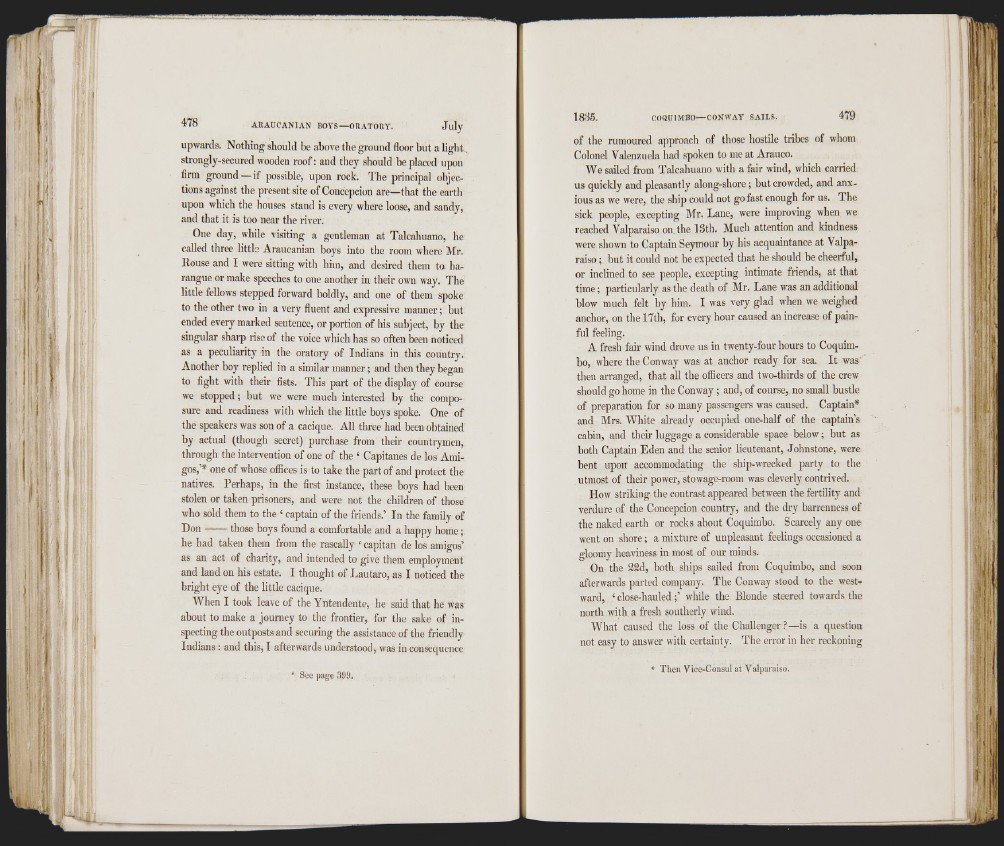
478 ARAUCANIAN BOYS— ORATORY. July
upwards. Nothing should be above the ground floor but a light
strongly-secured wooden roof; and they should be placed upon
firm ground—if possible, upon rock. The principal objections
against the present site of Concepcion are—that the earth
upon which the houses stand is every where loose, and sandy,
and that it is too near the river.
One day, while visiting a gentleman at Talcahuano, he
called three little Araucanian boys into the room where Mr.
Rouse and I were sitting with him, and desired them to harangue
or make speeches to one another in their own way. The
little fellows stepped forward boldly, and one of them spoke
to the other two in a very fluent and expressive manner; but
ended every mai-ked sentence, or portion of his subject, by the
singular sharp rise of the voice which has so often been noticed
as a peculiarity in the oratory of Indians in this country.
Another boy replied in a similar manner; and then they began
to fight with their fists. This part of the display of course
we stopped ; but we were much interested by the composure
and readiness with which the little boys spoke. One of
the speakers was son of a cacique. All three had been obtained
by actual (though secret) purchase from their countrymen,
through the intervention of one of the ‘ Capitanes de los Amigos,’*
one of whose offices is to take the part of and protect the
natives. Perhaps, in the first instance, these boys had been
stolen or taken prisoners, and were not the children of those
who sold them to the ‘ captain of the friends.’ In the family of
D o n those boys found a comfortable and a happy home;
he had taken them from the rascally ‘ capitan de los amigos’
as an act of charity, and intended to give them employment
and land on his estate. I thought of Lautaro, as I noticed the
bright eye of the little cacique.
When I took leave of the Yntendente, he said that he was
about to make a journey to the frontier, for the sake of inspecting
the outposts and securing the assistance of the friendly
Indians : and this, I afterwards understood, was in consequence
* Sec pag-o 399.
of the rumoured approach of those hostile tribes of whom
Colonel Valenzuela had spoken to me at Arauco.
We sailed from Talcahuano with a fair wind, which carried
us quickly and pleasantly along-shore ; but crowded, and anxious
as we were, the ship could not go fast enough for us. The
sick people, excepting Mr. Lane, were improving when we
reached Valparaiso on the 13th. Much attention and kindness
were shown to Captain Seymour by his acquaintance at Valparaiso
; hut it could not be expected that he should be cheerful,
or inclined to see people, excepting intimate friends, at that
time; particularly as the death of Mr. Lane was an additional
blow much felt by him. I was very glad when we weighed
anchor, on the 17th, for every hour caused an increase of painful
feeling.
A fresh fair wind drove us in twenty-four hours to Coquimbo,
where the Conway was at anchor ready for sea. I t was
then arranged, that all the officers and two-thirds of the crew
should go home in the Conway ; and, of course, no small bustle
of preparation for so many passengers was caused. Captain*
and Mrs. White abeady occupied one-half of the captain’s
cabin, and their luggage a considerable space below; but as
both Captain Lden and the senior lieutenant, Johnstone, were
bent upon accommodating the ship-wrecked party to the
utmost of their power, stowage-room was cleverly contrived.
How striking the contrast appeared between the fertility and
verdure of the Concepcion country, and the dry barrenness of
the naked earth or rocks about Coquimbo. Scarcely any one
went on shore; a mixture of unpleasant feelings occasioned a
gloomy heaviness in most of our minds.
On the 22d, both ships sailed from Coquimbo, and soon
afterwards parted company. The Conway stood to the westward,
‘ close-hauled;’ while the Blonde steered towards the
north with a fresh southerly wind.
What caused the loss of the Challenger.? —is a question
not easy to answer with certainty. The error in her reckoning
I H
* iiiii I '1 h:,
i
1
’
■
r
ll
1
* Then Vice-Consul at Valparaiso.